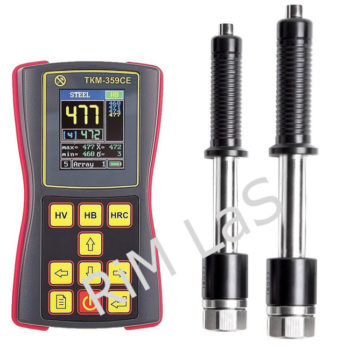Material testing plays an important role in industries such as manufacturing, construction, aerospace, and metallurgy. Testing the hardness of metals and alloys assures that they meet the necessary standards for quality, strength, and safety. Various testing methods are available in the market.
Leeb Hardness Tester has achieved popularity for its efficiency, portability, and accuracy. If you are looking for a reliable and trustworthy method for on-field material testing, here is why you should use the Leeb Hardness Tester.
What is a Leeb hardness tester?
A Leeb Hardness Tester is also known as a rebound hardness tester. It is a portable device that can easily measure the hardness of the metal by checking the speed of the effective body. The results are displayed in Leeb Hardness values (HL), which can also be converted into scales like HRC, HB, HV, and HRB, depending on the testing requirement.
Benefits of Using a Leeb Hardness Tester
Transportable and Easy to Use
In the traditional method, the heavy machines like Rockwell or Vickers testers are large and non-portable. On the other hand, Leeb hardness testers are portable, allowing professionals and technicians to perform tests directly on-site without carrying heavy samples. Using this method saves both time and cost in industrial operations.
Fast and Non-Destructive Testing
Using this method is non-destructive, which means it does not harm the material during the testing period. It provides the result very fast, making it ideal for real-time quality control in a production environment and inspection in the field.
Versatility in Material Testing
One of the best advantages of using this LEEB Hardness Tester TKM-359CE is its capability to check different metals like copper, aluminium, cast iron, and alloys. Many advanced models can keep the results and conduct the automatic conversions and are supplied with multiple impact instruments to check different types of materials.
Wide Scope
The Rebound Hardness Tester can measure a wide range of hardness values, from soft to extremely hard metals. This wide range makes them suitable for industries like power generation, shipbuilding, aerospace, and automotive manufacturing.
Use of Digital Leeb Hardness Tester
Leeb Hardness testers are mostly used in various industries because of their flexibility and efficiency. Some of the main reasons to use the Rebound Hardness Tester.
- On-Field Industrial Inspection:-Check pipelines, turbines, heavy machines, and structural components without disconnecting.
- Quality Control in Production: Confirm that products fulfill hardness standards before shipping.
- Maintenance and Repair Inspection:-Determine wear or material degradation in parts like shafts, bearings, and gears.
- Metallurgical Research: Check material properties in laboratories or during research on a product.
Comparing the Leeb Hardness Tester to the Traditional Method
Traditional Hardness Testing methods like Brinwell, Rockwell, or Vickers need big testing machines and sometimes destructive sample preparation. These techniques are accurate but not suitable for field use. In contrast,
- Leeb Hardness Testers provide:
- Fast results without sample preparation.
- Suitable for field inspection.
- Non-destructive testing abilities.
- Easy data recording and digital connectivity.
On the other hand, traditional methods are suitable for laboratory testing; the Hardness Tester is the best choice for on-site metal testing.
Characteristics of Using the Rebound Hardness Tester
When you choose the Hardness Tester for your testing, see the following properties:
- Measurement Accuracy: Select a model with high repeatability and accurate calibration.
- Multiple Hardness Scales: Ability to show HRC, HB, HV, Hl, and more.
- Multiple Impact Devices: Capable of checking different shapes, sizes, and hardness levels.
- Durable and Compact Design: For on-site use, choose a powerful model that can resist extreme conditions.
Investing in the right tester provides long-term reliability and consistent results in material testing. Then I suggest you use Rimlas Hardness Tester. It will help you.
Why Choose Rimlas Rebound Hardness Tester?
Choosing Rimlas Leeb Hardness Tester, see the various reasons to prefer it:-
- Transportable and easy to use in any location.
- Fast and non-destructive hardness measurement.
- Cost-effective for field and factory use.
- Suitable for quality control, maintenance, and inspection.
It doesn’t matter if you are in metal fabrication, manufacturing, or equipment maintenance; the Leeb Hardness tester simplifies your hardness testing process with assured accuracy. You can also use the Rimlas UCI Hardness Tester. Let’s see the whole article in a few words.
Final Words
Nowadays in industries, capability and accuracy in material testing cannot be compromised. The Rimlas Leeb Hardness Tester provides the best balance of reliability, speed, and portability, making it go to the engineers and quality control professionals. By using the Leeb Hardness Tester, you can enhance productivity, lower costs, and ensure the durability and safety of your materials.



